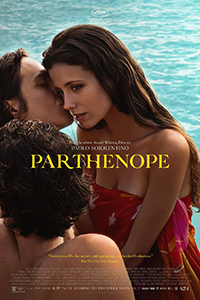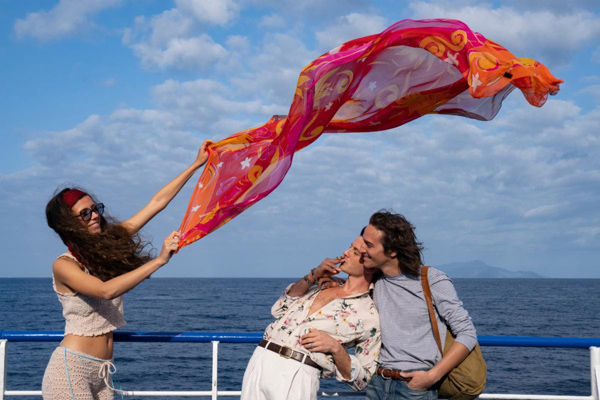The Boring & Beautiful: Sorrentino’s Tone Deaf Portrait of a Lady
 It’s unfortunate no one’s as likely to be infatuated with the eponymous Parthenope (pronounced like ‘Penelope’) as Paolo Sorrentino, utilizing the myth of the failed siren as subtext for a bildungsroman about a beautiful young woman in 1970s Naples. Having borrowed (or rather plundered) the narrative aesthetics of Fellini over the past decade, perhaps no where more successfully than with his 2013 success The Great Beauty, Sorrentino turns to mythology to bolster the rise of a Napolitano goddess amongst the angsty social scene whose denizens have grown numbly accustomed to the languid paradise around them. While Sorrentino gifts newcomer Celeste Dalla Porta with a glorious showcase to introduce her beauty as the narrative centrifugal force, the actual star of the film is Sorrentino’s regular DP Daria D’Antonio. While Cristiano Travaglioli tends to keep every extensive lengthy shot composition, perhaps as a means to feel drunk on Porta’s beauty by sheer immersive force, there’s no doubting the film’s sumptuous power as visual spectacle. But Sorrentino doesn’t have anything compelling to say amidst melodramatic spikes of emotion which fail to generate their intended effect.
It’s unfortunate no one’s as likely to be infatuated with the eponymous Parthenope (pronounced like ‘Penelope’) as Paolo Sorrentino, utilizing the myth of the failed siren as subtext for a bildungsroman about a beautiful young woman in 1970s Naples. Having borrowed (or rather plundered) the narrative aesthetics of Fellini over the past decade, perhaps no where more successfully than with his 2013 success The Great Beauty, Sorrentino turns to mythology to bolster the rise of a Napolitano goddess amongst the angsty social scene whose denizens have grown numbly accustomed to the languid paradise around them. While Sorrentino gifts newcomer Celeste Dalla Porta with a glorious showcase to introduce her beauty as the narrative centrifugal force, the actual star of the film is Sorrentino’s regular DP Daria D’Antonio. While Cristiano Travaglioli tends to keep every extensive lengthy shot composition, perhaps as a means to feel drunk on Porta’s beauty by sheer immersive force, there’s no doubting the film’s sumptuous power as visual spectacle. But Sorrentino doesn’t have anything compelling to say amidst melodramatic spikes of emotion which fail to generate their intended effect.
Born in the placid waters outside of her parents’ palatial estate in 1950 Naples, Parthenope is welcomed into a family aglow with possibilities. Sharing an incredibly close bond with her older brother Raimondo (Daniel Rienzo), by 1968 Parthenope (Della Porta) has grown into an incredibly beautiful and intelligent young woman. The siblings both share an affinity for Sandri (Dario Aita), who pines endlessly for the attention of Parthenope. But there seems to be something wrong with the emotionally fragile Raimondo, who kills himself one night while his sister experiences sexual pleasure with Sandri. The family crumbles, and doubt is cast over Parthenope’s future, currently studying anthropology and wanting to research suicide. Her thesis advisor, the crusty Professor Marotta (Silvio Orlando) instead convinces her to study the anthropological effects of miracles. As years pass, Parthenope decides to pursue the course of an academic.

Della Porta is a striking screen presence, ensconced in a film which recalls the introduction of Marine Vacth in the somewhat more lively Young & Beautiful (2013) from Francois Ozon. She recalls both Ana de Armas and a young Susan Sarandon with her large eyes and mane of brunette hair. It’s too bad she’s often called upon to deliver an endless charade of poses which seem intended purely for the sake of ogling. The film continually tells rather than shows her commitment to pursuing an education, even though a subplot involving her brief stint attempting to be an actress seems to end poorly as it leads to a tragic romance and an abortion acquired as easily as if she were given antibiotics to treat a STI. A rather incestuous relationship with her depressed brother and their shared friend Sandri skirts around Bertolucci’s The Dreamers (2003) territory before ending in Riamondo’s suicide, a plot twist which seems instantly inevitable when the film segues to 1968, a dramatic catalyst which is leaned on quite heavily.
Along her incredibly languid journey, there are a variety of detours with strange characters, as has come to be expected from Sorrentino. A ridiculously named diva, Greta Cool (Luisa Ranieri) comes back to Naples to publicly shame the locals, and Flora Malta (Isabella Ferrari), an acting and diction coach with a botched face courtesy of a charlatan plastic surgeon, insists on intimate kissing with her insolent ingenue. An uncomfortable wedding involving two major Napolitano families uniting showcases a public sex ritual which seems unnecessarily Medieval. And the last stop on her distilled life explorations is a tortured romance during her journey as a performer with a handsome gentleman (Marlon Joubert from The Hand of God, 2021) stymies her pursuit with future lovers.
Parthenope’s relationship with two older gentlemen prove to be integral to finding her voice. The first is the actual American author John Cheever, a depressed, gay alcoholic played with emotional fervor by Gary Oldman. He asks Parthenope if she understands how distracting her beauty is. But this is a question which should be posed to Sorrentino. “Beauty is like war, it opens doors,” Cheever also proclaims. Sometimes those opened doors lead to tombs where narrative attentiveness has been laid to rest. Her other mentor, Silvio Orlando’s persnickety Professor Marotta, is more prominent, revealing, eventually, a morbid visual spectacle in the film’s final moments meant to convey unconditional love. Orlando scores a fair share of laughs with his bitchy quips, but often this feels like a character belonging to another film. This theme of Parthenope rejecting love as a sustainable option for self-actualization becomes her ultimate personal motif, unsure as she seems about it until the film jumps from the early 1980s to 2023, where Parthenope is now played by Stefania Sandrelli on the day of her retirement, apparently having modeled her professional persona over that of Marotta. She’s remained unmarried and childless and keeps her female colleagues at a careful distance. If this is meant to be Sorrentino’s way of conceiving what a woman’s empowerment should look like after a filmography littered with aging playboys (often played by Toni Servillo), it’s certainly a disconsolate, disappointing juxtaposition.
Reviewed on May 21st at the 2024 Cannes Film Festival – Competition. 136 Mins
★/☆☆☆☆☆


